Effect of low Socioeconomic Condition on GCSE result
VerifiedAdded on 2023/01/16
|7
|1540
|84
AI Summary
This essay explores the impact of low socioeconomic conditions on GCSE results and academic achievement. It discusses the inequality in health distribution, quality of life, education, and resources that contribute to the global problem. The essay highlights the barriers faced by low-income students and suggests improvements to the education system. The study also examines the correlation between socioeconomic status and GCSE outcomes.
Contribute Materials
Your contribution can guide someone’s learning journey. Share your
documents today.
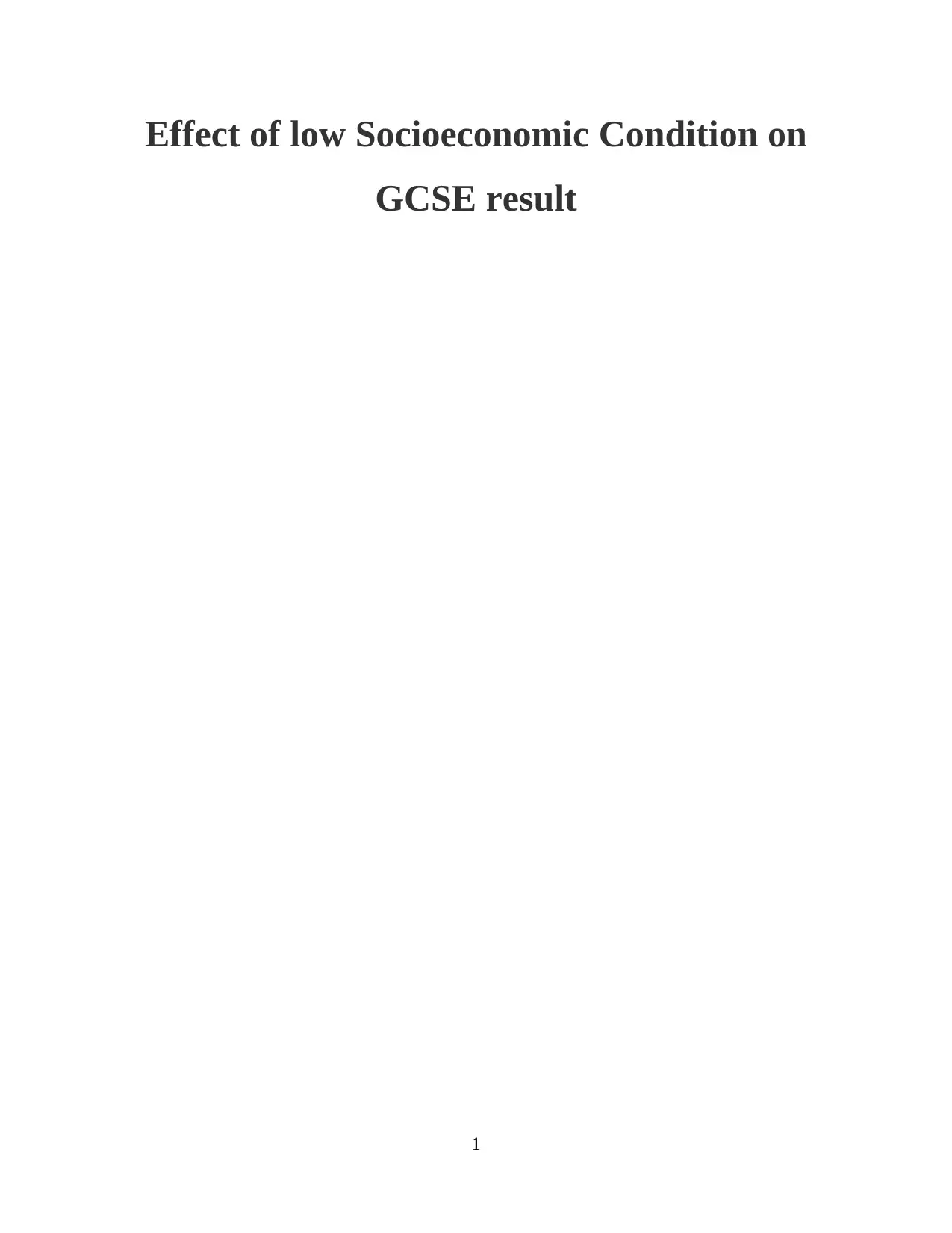
Effect of low Socioeconomic Condition on
GCSE result
1
GCSE result
1
Secure Best Marks with AI Grader
Need help grading? Try our AI Grader for instant feedback on your assignments.
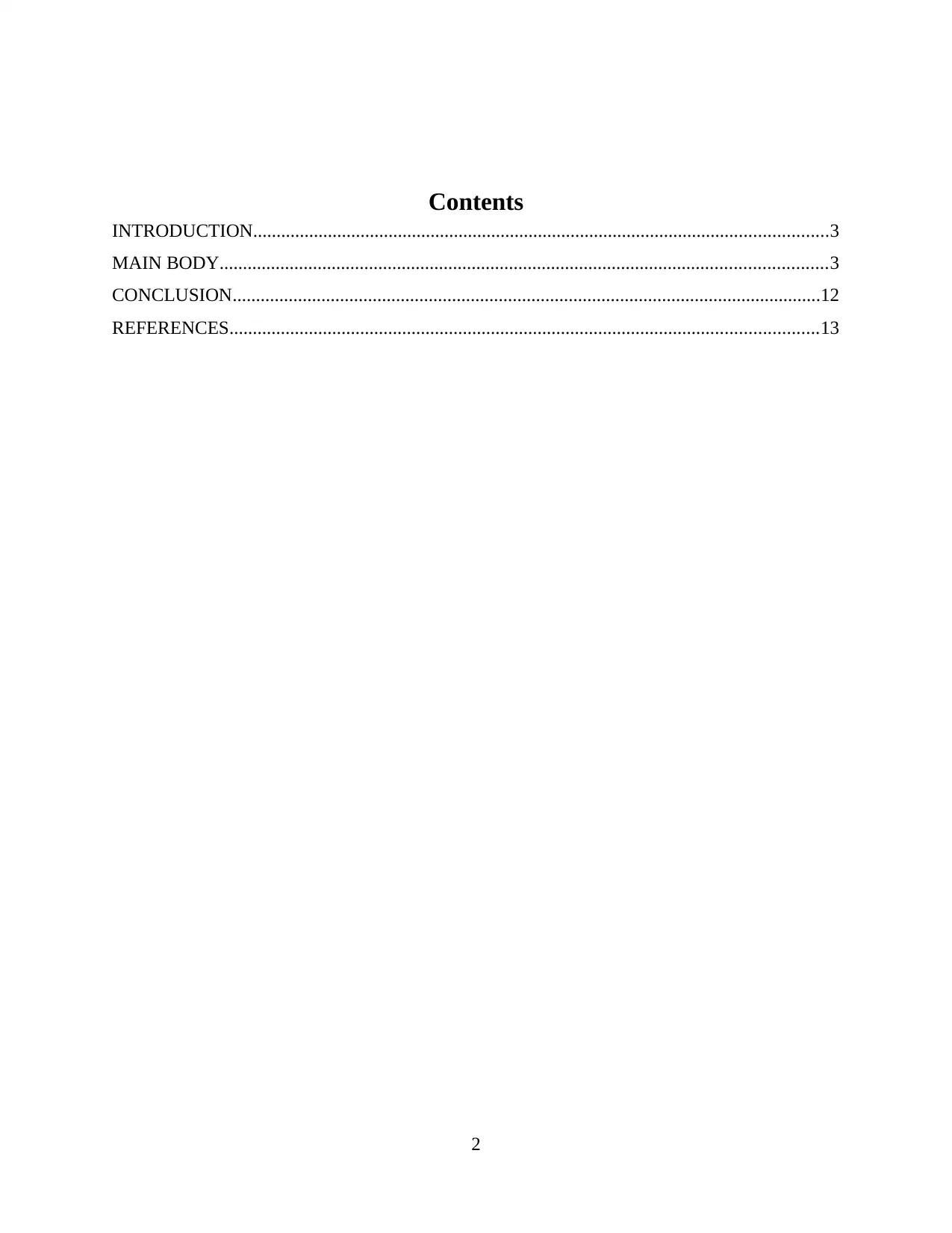
Contents
INTRODUCTION...........................................................................................................................3
MAIN BODY..................................................................................................................................3
CONCLUSION..............................................................................................................................12
REFERENCES..............................................................................................................................13
2
INTRODUCTION...........................................................................................................................3
MAIN BODY..................................................................................................................................3
CONCLUSION..............................................................................................................................12
REFERENCES..............................................................................................................................13
2
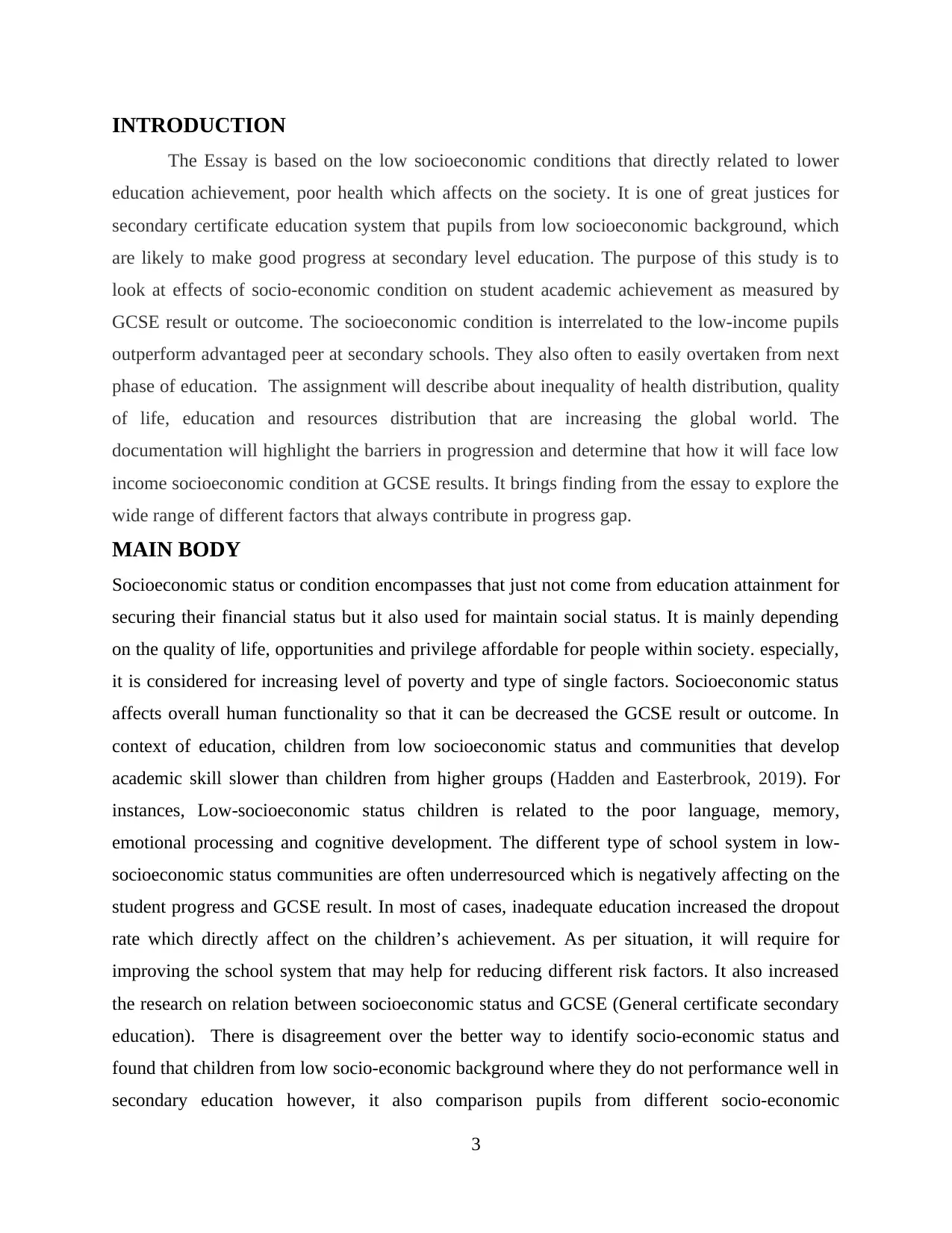
INTRODUCTION
The Essay is based on the low socioeconomic conditions that directly related to lower
education achievement, poor health which affects on the society. It is one of great justices for
secondary certificate education system that pupils from low socioeconomic background, which
are likely to make good progress at secondary level education. The purpose of this study is to
look at effects of socio-economic condition on student academic achievement as measured by
GCSE result or outcome. The socioeconomic condition is interrelated to the low-income pupils
outperform advantaged peer at secondary schools. They also often to easily overtaken from next
phase of education. The assignment will describe about inequality of health distribution, quality
of life, education and resources distribution that are increasing the global world. The
documentation will highlight the barriers in progression and determine that how it will face low
income socioeconomic condition at GCSE results. It brings finding from the essay to explore the
wide range of different factors that always contribute in progress gap.
MAIN BODY
Socioeconomic status or condition encompasses that just not come from education attainment for
securing their financial status but it also used for maintain social status. It is mainly depending
on the quality of life, opportunities and privilege affordable for people within society. especially,
it is considered for increasing level of poverty and type of single factors. Socioeconomic status
affects overall human functionality so that it can be decreased the GCSE result or outcome. In
context of education, children from low socioeconomic status and communities that develop
academic skill slower than children from higher groups (Hadden and Easterbrook, 2019). For
instances, Low-socioeconomic status children is related to the poor language, memory,
emotional processing and cognitive development. The different type of school system in low-
socioeconomic status communities are often underresourced which is negatively affecting on the
student progress and GCSE result. In most of cases, inadequate education increased the dropout
rate which directly affect on the children’s achievement. As per situation, it will require for
improving the school system that may help for reducing different risk factors. It also increased
the research on relation between socioeconomic status and GCSE (General certificate secondary
education). There is disagreement over the better way to identify socio-economic status and
found that children from low socio-economic background where they do not performance well in
secondary education however, it also comparison pupils from different socio-economic
3
The Essay is based on the low socioeconomic conditions that directly related to lower
education achievement, poor health which affects on the society. It is one of great justices for
secondary certificate education system that pupils from low socioeconomic background, which
are likely to make good progress at secondary level education. The purpose of this study is to
look at effects of socio-economic condition on student academic achievement as measured by
GCSE result or outcome. The socioeconomic condition is interrelated to the low-income pupils
outperform advantaged peer at secondary schools. They also often to easily overtaken from next
phase of education. The assignment will describe about inequality of health distribution, quality
of life, education and resources distribution that are increasing the global world. The
documentation will highlight the barriers in progression and determine that how it will face low
income socioeconomic condition at GCSE results. It brings finding from the essay to explore the
wide range of different factors that always contribute in progress gap.
MAIN BODY
Socioeconomic status or condition encompasses that just not come from education attainment for
securing their financial status but it also used for maintain social status. It is mainly depending
on the quality of life, opportunities and privilege affordable for people within society. especially,
it is considered for increasing level of poverty and type of single factors. Socioeconomic status
affects overall human functionality so that it can be decreased the GCSE result or outcome. In
context of education, children from low socioeconomic status and communities that develop
academic skill slower than children from higher groups (Hadden and Easterbrook, 2019). For
instances, Low-socioeconomic status children is related to the poor language, memory,
emotional processing and cognitive development. The different type of school system in low-
socioeconomic status communities are often underresourced which is negatively affecting on the
student progress and GCSE result. In most of cases, inadequate education increased the dropout
rate which directly affect on the children’s achievement. As per situation, it will require for
improving the school system that may help for reducing different risk factors. It also increased
the research on relation between socioeconomic status and GCSE (General certificate secondary
education). There is disagreement over the better way to identify socio-economic status and
found that children from low socio-economic background where they do not performance well in
secondary education however, it also comparison pupils from different socio-economic
3
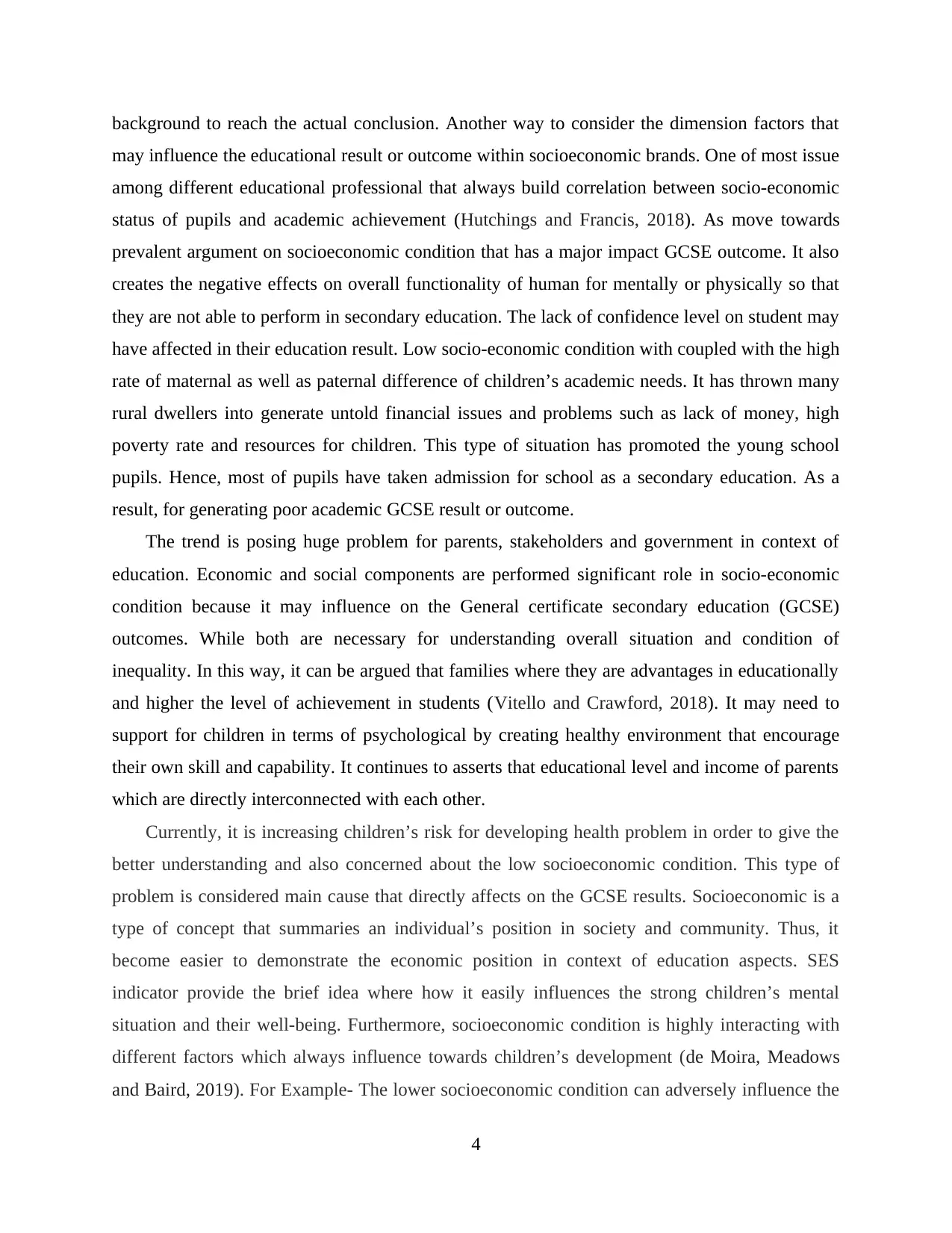
background to reach the actual conclusion. Another way to consider the dimension factors that
may influence the educational result or outcome within socioeconomic brands. One of most issue
among different educational professional that always build correlation between socio-economic
status of pupils and academic achievement (Hutchings and Francis, 2018). As move towards
prevalent argument on socioeconomic condition that has a major impact GCSE outcome. It also
creates the negative effects on overall functionality of human for mentally or physically so that
they are not able to perform in secondary education. The lack of confidence level on student may
have affected in their education result. Low socio-economic condition with coupled with the high
rate of maternal as well as paternal difference of children’s academic needs. It has thrown many
rural dwellers into generate untold financial issues and problems such as lack of money, high
poverty rate and resources for children. This type of situation has promoted the young school
pupils. Hence, most of pupils have taken admission for school as a secondary education. As a
result, for generating poor academic GCSE result or outcome.
The trend is posing huge problem for parents, stakeholders and government in context of
education. Economic and social components are performed significant role in socio-economic
condition because it may influence on the General certificate secondary education (GCSE)
outcomes. While both are necessary for understanding overall situation and condition of
inequality. In this way, it can be argued that families where they are advantages in educationally
and higher the level of achievement in students (Vitello and Crawford, 2018). It may need to
support for children in terms of psychological by creating healthy environment that encourage
their own skill and capability. It continues to asserts that educational level and income of parents
which are directly interconnected with each other.
Currently, it is increasing children’s risk for developing health problem in order to give the
better understanding and also concerned about the low socioeconomic condition. This type of
problem is considered main cause that directly affects on the GCSE results. Socioeconomic is a
type of concept that summaries an individual’s position in society and community. Thus, it
become easier to demonstrate the economic position in context of education aspects. SES
indicator provide the brief idea where how it easily influences the strong children’s mental
situation and their well-being. Furthermore, socioeconomic condition is highly interacting with
different factors which always influence towards children’s development (de Moira, Meadows
and Baird, 2019). For Example- The lower socioeconomic condition can adversely influence the
4
may influence the educational result or outcome within socioeconomic brands. One of most issue
among different educational professional that always build correlation between socio-economic
status of pupils and academic achievement (Hutchings and Francis, 2018). As move towards
prevalent argument on socioeconomic condition that has a major impact GCSE outcome. It also
creates the negative effects on overall functionality of human for mentally or physically so that
they are not able to perform in secondary education. The lack of confidence level on student may
have affected in their education result. Low socio-economic condition with coupled with the high
rate of maternal as well as paternal difference of children’s academic needs. It has thrown many
rural dwellers into generate untold financial issues and problems such as lack of money, high
poverty rate and resources for children. This type of situation has promoted the young school
pupils. Hence, most of pupils have taken admission for school as a secondary education. As a
result, for generating poor academic GCSE result or outcome.
The trend is posing huge problem for parents, stakeholders and government in context of
education. Economic and social components are performed significant role in socio-economic
condition because it may influence on the General certificate secondary education (GCSE)
outcomes. While both are necessary for understanding overall situation and condition of
inequality. In this way, it can be argued that families where they are advantages in educationally
and higher the level of achievement in students (Vitello and Crawford, 2018). It may need to
support for children in terms of psychological by creating healthy environment that encourage
their own skill and capability. It continues to asserts that educational level and income of parents
which are directly interconnected with each other.
Currently, it is increasing children’s risk for developing health problem in order to give the
better understanding and also concerned about the low socioeconomic condition. This type of
problem is considered main cause that directly affects on the GCSE results. Socioeconomic is a
type of concept that summaries an individual’s position in society and community. Thus, it
become easier to demonstrate the economic position in context of education aspects. SES
indicator provide the brief idea where how it easily influences the strong children’s mental
situation and their well-being. Furthermore, socioeconomic condition is highly interacting with
different factors which always influence towards children’s development (de Moira, Meadows
and Baird, 2019). For Example- The lower socioeconomic condition can adversely influence the
4
Secure Best Marks with AI Grader
Need help grading? Try our AI Grader for instant feedback on your assignments.
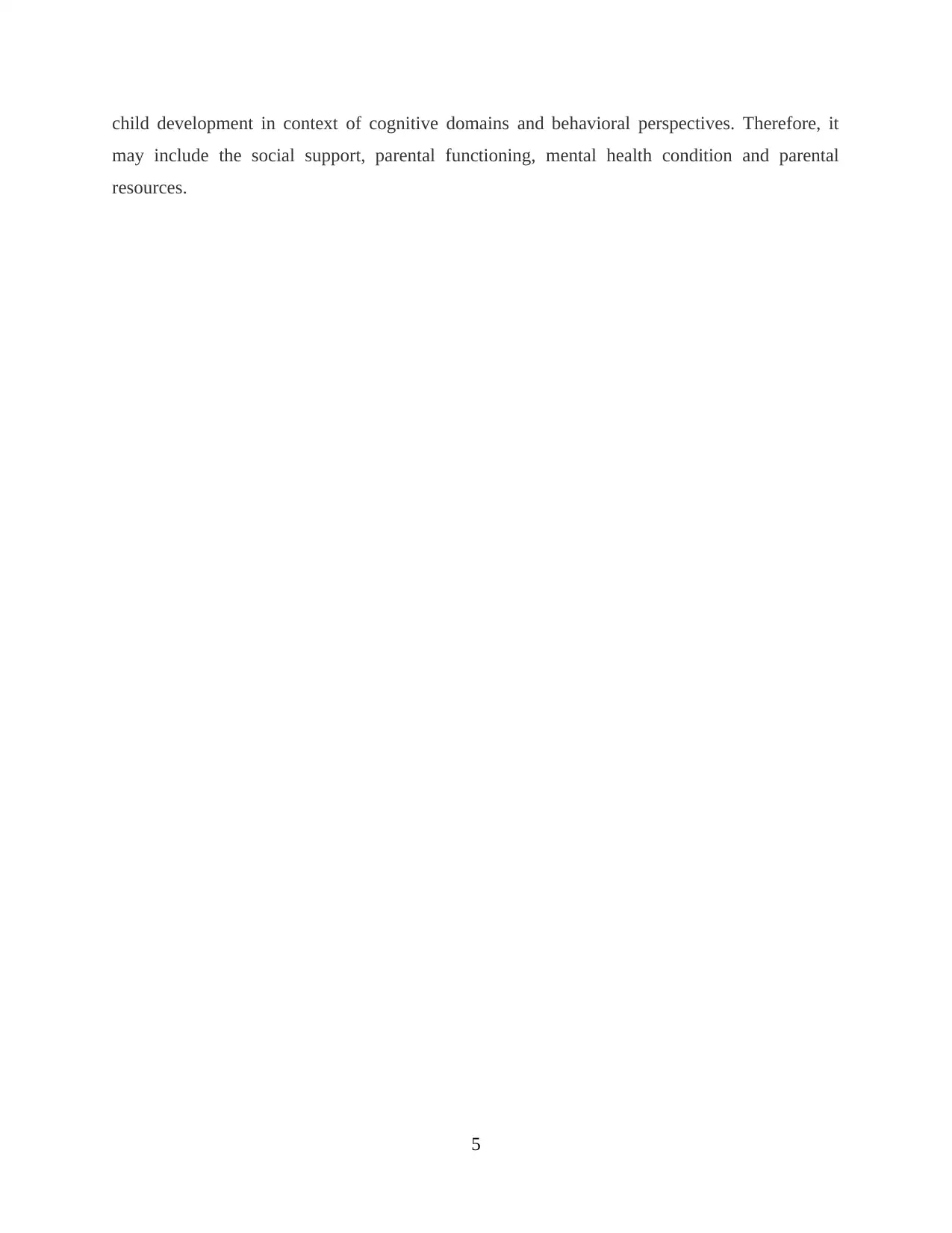
child development in context of cognitive domains and behavioral perspectives. Therefore, it
may include the social support, parental functioning, mental health condition and parental
resources.
5
may include the social support, parental functioning, mental health condition and parental
resources.
5
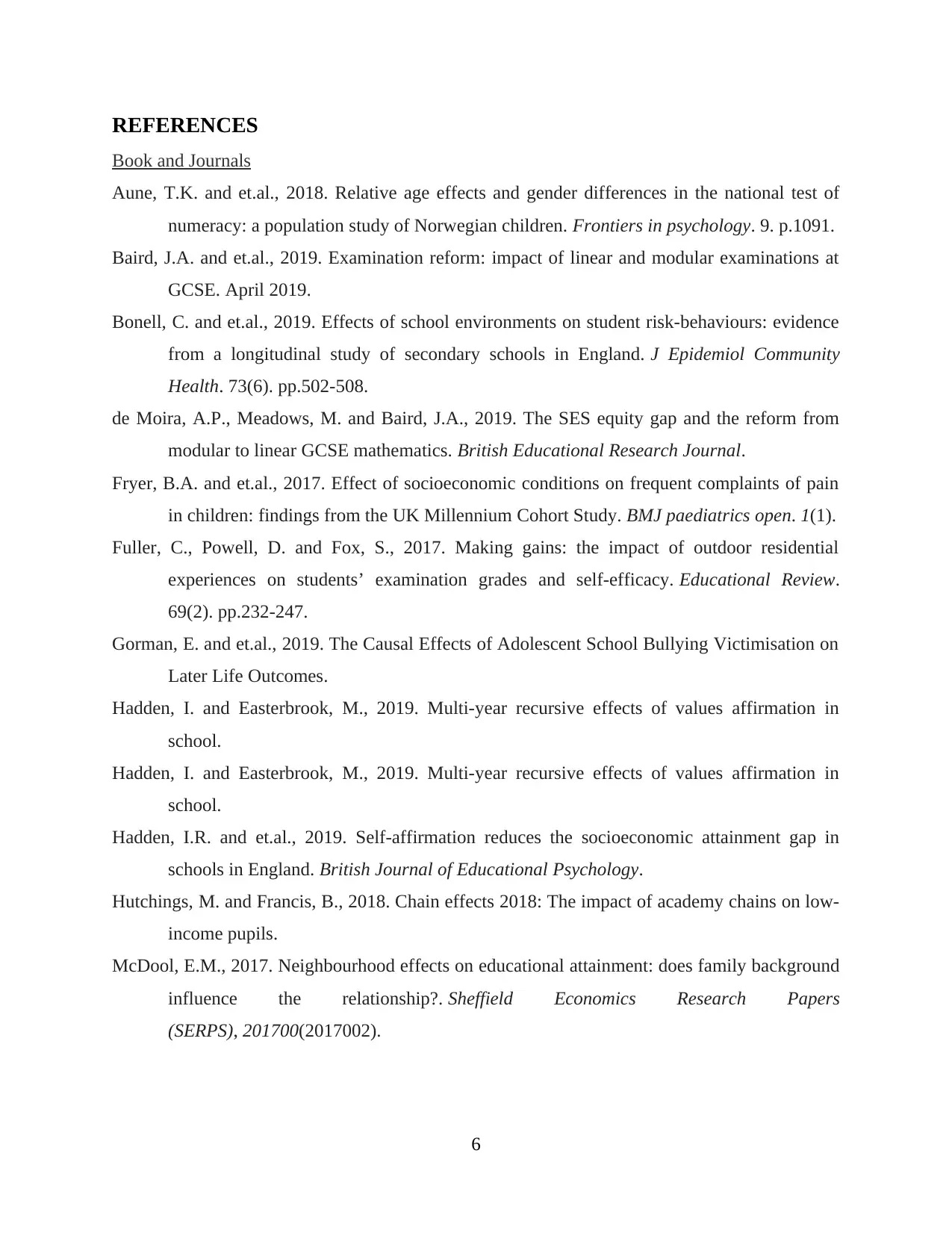
REFERENCES
Book and Journals
Aune, T.K. and et.al., 2018. Relative age effects and gender differences in the national test of
numeracy: a population study of Norwegian children. Frontiers in psychology. 9. p.1091.
Baird, J.A. and et.al., 2019. Examination reform: impact of linear and modular examinations at
GCSE. April 2019.
Bonell, C. and et.al., 2019. Effects of school environments on student risk-behaviours: evidence
from a longitudinal study of secondary schools in England. J Epidemiol Community
Health. 73(6). pp.502-508.
de Moira, A.P., Meadows, M. and Baird, J.A., 2019. The SES equity gap and the reform from
modular to linear GCSE mathematics. British Educational Research Journal.
Fryer, B.A. and et.al., 2017. Effect of socioeconomic conditions on frequent complaints of pain
in children: findings from the UK Millennium Cohort Study. BMJ paediatrics open. 1(1).
Fuller, C., Powell, D. and Fox, S., 2017. Making gains: the impact of outdoor residential
experiences on students’ examination grades and self-efficacy. Educational Review.
69(2). pp.232-247.
Gorman, E. and et.al., 2019. The Causal Effects of Adolescent School Bullying Victimisation on
Later Life Outcomes.
Hadden, I. and Easterbrook, M., 2019. Multi-year recursive effects of values affirmation in
school.
Hadden, I. and Easterbrook, M., 2019. Multi-year recursive effects of values affirmation in
school.
Hadden, I.R. and et.al., 2019. Self‐affirmation reduces the socioeconomic attainment gap in
schools in England. British Journal of Educational Psychology.
Hutchings, M. and Francis, B., 2018. Chain effects 2018: The impact of academy chains on low-
income pupils.
McDool, E.M., 2017. Neighbourhood effects on educational attainment: does family background
influence the relationship?. Sheffield Economics Research Papers
(SERPS), 201700(2017002).
6
Book and Journals
Aune, T.K. and et.al., 2018. Relative age effects and gender differences in the national test of
numeracy: a population study of Norwegian children. Frontiers in psychology. 9. p.1091.
Baird, J.A. and et.al., 2019. Examination reform: impact of linear and modular examinations at
GCSE. April 2019.
Bonell, C. and et.al., 2019. Effects of school environments on student risk-behaviours: evidence
from a longitudinal study of secondary schools in England. J Epidemiol Community
Health. 73(6). pp.502-508.
de Moira, A.P., Meadows, M. and Baird, J.A., 2019. The SES equity gap and the reform from
modular to linear GCSE mathematics. British Educational Research Journal.
Fryer, B.A. and et.al., 2017. Effect of socioeconomic conditions on frequent complaints of pain
in children: findings from the UK Millennium Cohort Study. BMJ paediatrics open. 1(1).
Fuller, C., Powell, D. and Fox, S., 2017. Making gains: the impact of outdoor residential
experiences on students’ examination grades and self-efficacy. Educational Review.
69(2). pp.232-247.
Gorman, E. and et.al., 2019. The Causal Effects of Adolescent School Bullying Victimisation on
Later Life Outcomes.
Hadden, I. and Easterbrook, M., 2019. Multi-year recursive effects of values affirmation in
school.
Hadden, I. and Easterbrook, M., 2019. Multi-year recursive effects of values affirmation in
school.
Hadden, I.R. and et.al., 2019. Self‐affirmation reduces the socioeconomic attainment gap in
schools in England. British Journal of Educational Psychology.
Hutchings, M. and Francis, B., 2018. Chain effects 2018: The impact of academy chains on low-
income pupils.
McDool, E.M., 2017. Neighbourhood effects on educational attainment: does family background
influence the relationship?. Sheffield Economics Research Papers
(SERPS), 201700(2017002).
6
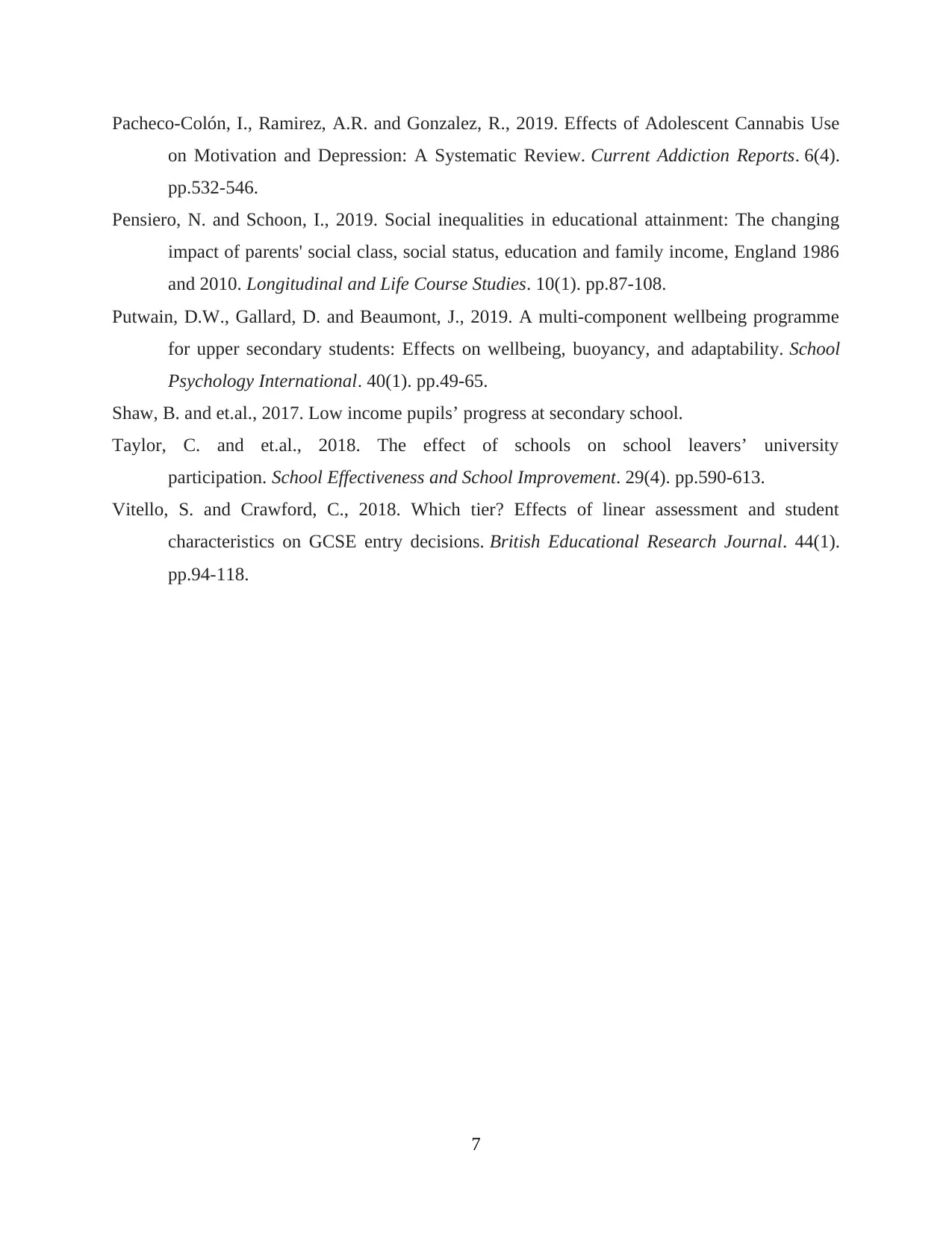
Pacheco-Colón, I., Ramirez, A.R. and Gonzalez, R., 2019. Effects of Adolescent Cannabis Use
on Motivation and Depression: A Systematic Review. Current Addiction Reports. 6(4).
pp.532-546.
Pensiero, N. and Schoon, I., 2019. Social inequalities in educational attainment: The changing
impact of parents' social class, social status, education and family income, England 1986
and 2010. Longitudinal and Life Course Studies. 10(1). pp.87-108.
Putwain, D.W., Gallard, D. and Beaumont, J., 2019. A multi-component wellbeing programme
for upper secondary students: Effects on wellbeing, buoyancy, and adaptability. School
Psychology International. 40(1). pp.49-65.
Shaw, B. and et.al., 2017. Low income pupils’ progress at secondary school.
Taylor, C. and et.al., 2018. The effect of schools on school leavers’ university
participation. School Effectiveness and School Improvement. 29(4). pp.590-613.
Vitello, S. and Crawford, C., 2018. Which tier? Effects of linear assessment and student
characteristics on GCSE entry decisions. British Educational Research Journal. 44(1).
pp.94-118.
7
on Motivation and Depression: A Systematic Review. Current Addiction Reports. 6(4).
pp.532-546.
Pensiero, N. and Schoon, I., 2019. Social inequalities in educational attainment: The changing
impact of parents' social class, social status, education and family income, England 1986
and 2010. Longitudinal and Life Course Studies. 10(1). pp.87-108.
Putwain, D.W., Gallard, D. and Beaumont, J., 2019. A multi-component wellbeing programme
for upper secondary students: Effects on wellbeing, buoyancy, and adaptability. School
Psychology International. 40(1). pp.49-65.
Shaw, B. and et.al., 2017. Low income pupils’ progress at secondary school.
Taylor, C. and et.al., 2018. The effect of schools on school leavers’ university
participation. School Effectiveness and School Improvement. 29(4). pp.590-613.
Vitello, S. and Crawford, C., 2018. Which tier? Effects of linear assessment and student
characteristics on GCSE entry decisions. British Educational Research Journal. 44(1).
pp.94-118.
7
1 out of 7
Related Documents
Your All-in-One AI-Powered Toolkit for Academic Success.
+13062052269
info@desklib.com
Available 24*7 on WhatsApp / Email
![[object Object]](/_next/static/media/star-bottom.7253800d.svg)
Unlock your academic potential
© 2024 | Zucol Services PVT LTD | All rights reserved.





